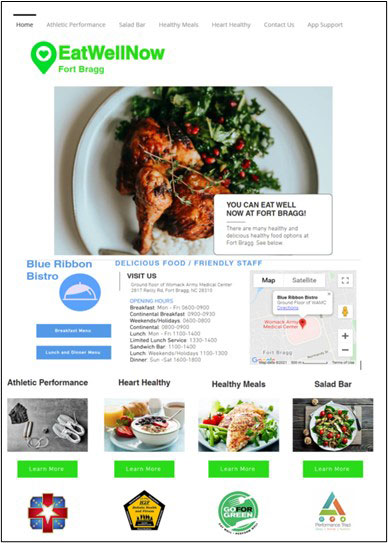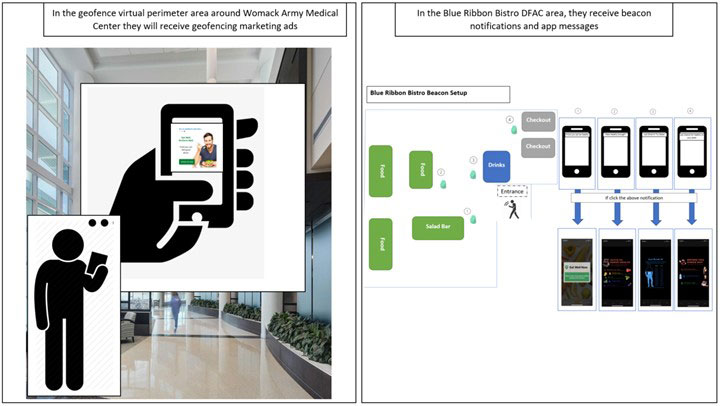Promoting healthier food purchases among military Service Members at Fort Bragg
June 30, 2021 | Download PDF

A majority of military Service Members are overweight or obese and are not meeting physical fitness goals, leading to increased health care costs and days of lost work per year. This is a potential national security threat as obesity and poor dietary choices have been associated with increased risk for musculoskeletal injuries and chronic illness and lack of physical readiness. Thus, new strategies are needed to optimize Warfighter performance.
One approach that military services have taken to address the obesity and readiness issue is to change the foods that Soldiers are purchasing through modifications of their food environment. An emerging technology that has potential to change how Soldiers interact with a food environment is ‘geofencing.’ This technology uses cellular networks and beacon-based Bluetooth signals to create a virtual perimeter that sends real-time targeted messages or “nudges” to those with mobile devices that enter a designed space, such as within immediate proximity of a dining facility, or DFAC. With Service Members increasingly using their mobile phones, this may be a viable approach to improve the utilization of healthier dining options on military bases and improve food purchases. To further explore this, an Advanced Medical Technology Initiative (AMTI) funded project out of Womack Army Medical Center, completed an in-depth formative evaluation of a healthy eating place-based technology pilot study at Fort Bragg to better understand the feasibility of this type of health promotion program in this setting.

The project tasks of this pilot study were successfully completed and largely included the development and testing of a multi-layered interactive food environment system that incorporated both geofencing and utilization of Bluetooth Beacons at a Fort Bragg dining facility, Womack Army Medical Center’s Blue Ribbon Bistro. The Womack team collaborated with key Fort Bragg stakeholders, topic experts, and Propellant Media to develop geotargeted advertisements, a dedicated webpage “goeatwellnow.com”, and a dedicated mobile phone application called “Eat Well Now” that served as the interaction hub between the user, the beacons and the dedicated webpage. The research team was able to successfully deploy the beacons and associated app within the Blue Ribbon Bistro and make them operational. They also created a connected data server which allowed them to understand interaction with the beacons and therefore allowed the Fort Bragg Department of Public Health and the Blue Ribbon Bistro staff to understand the effectiveness of different messaging approaches. “The goal is to ‘nudge’ users towards healthier decisions at each of these decision points, with simple messaging and graphics. We want to meet Soldiers where they are within their activities of daily life,” stated one of the Project Leads, Dr. Jared McGuirt.
This effort aligns with the AMTI Program’s FY20 areas of focus which are: 1) medical readiness of the total Army, and 2) Healthy & Satisfied Families and Beneficiaries. The Womack team successfully leveraged enterprise level solutions to align with the strategic plan of improving troop readiness and access to healthier food. This connects Service Members to health initiatives being promoted at military base public health centers and aligns with the Healthy Base Initiative.
The work this team has accomplished demonstrates that there is a clear opportunity to further build a scalable and impactful digital healthy eating food environment to encourage Soldiers to eat healthier and improve readiness. The research team believes there are many opportunities to further develop the interactive experience, including enhancing the app interface to allow for more tailored content based on the Soldier’s goals, and integrating the geofencing and Bluetooth analytics to create a very cohesive food environment experience. The hope is to listen and work with Soldiers and military service leaders in the future to further develop the system to optimize relatability, usability and impact.

The next step after this initial project would be a larger formal evaluation study examining the impact of the intervention on food purchases, dietary behaviors, and health outcomes among military Service Members interacting with the intervention. This is the clear next step to determine the potential of this innovation and the Womack researchers hope to continue to work with additional dining facilities at Fort Bragg and beyond to test and implement the system.
CPT Danielle Dunnagan, the Lead AMTI Innovator for this project stated, “The technology we are exploring in this pilot study has the potential to greatly impact the way we promote healthful food choices within the military food environment. As a Registered Dietitian, I am eager to use this technology in the future to help make the healthier dietary choice the easier one for military Service Members, especially within the footprint that they live and work.”
For additional information on this AMTI funded project, please contact Ms. Holly Pavliscsak at holly.h.pavliscsak.ctr@mail.mil.
This article was published in the January 2022 issue of the TATRC Times.